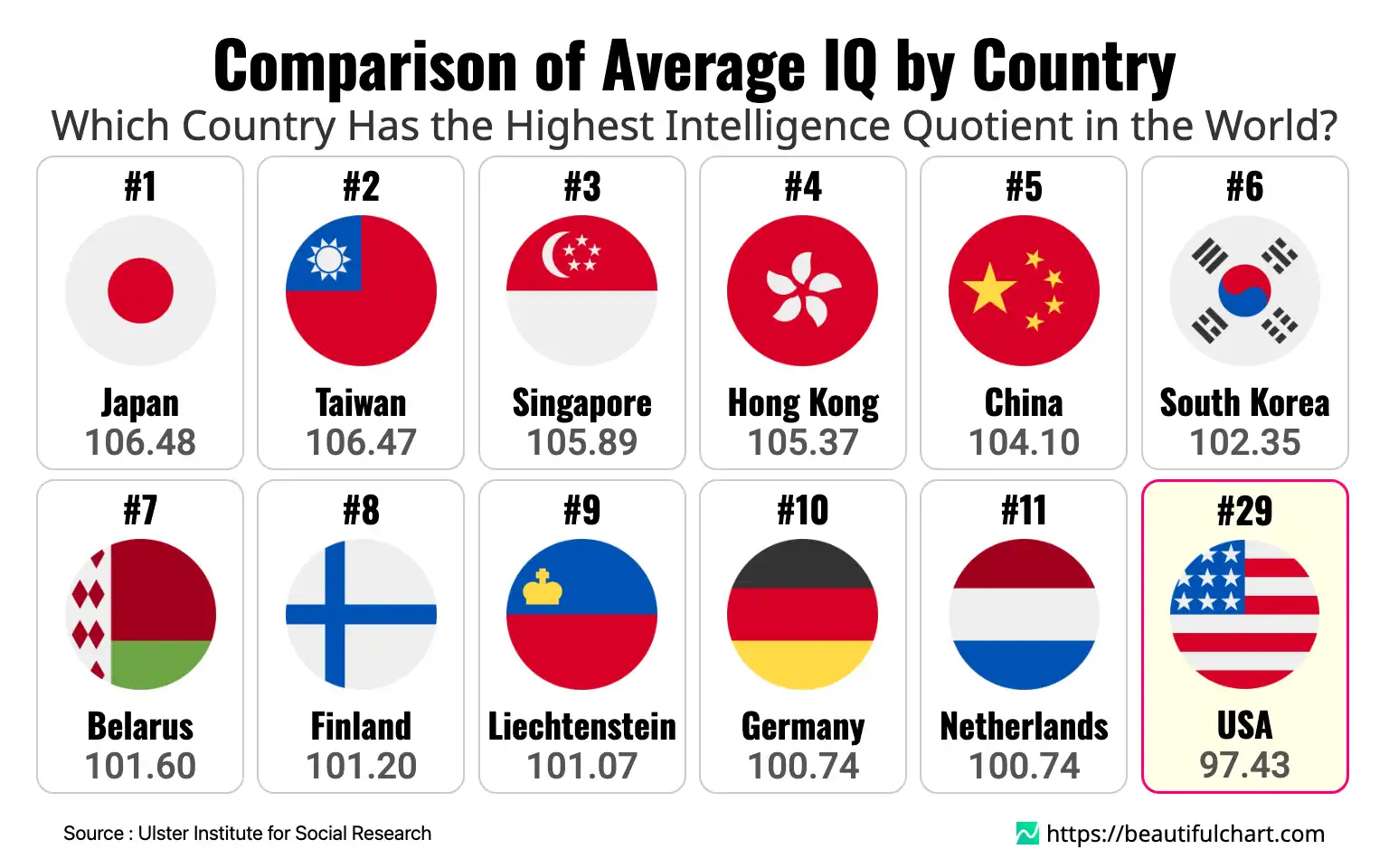Data on national average IQ scores reveals a significant concentration of high-ranking countries in East Asia. Japan leads the world with an average IQ of 106.48, closely followed by Taiwan at 106.47, Singapore at 105.89, and Hong Kong at 105.37. These nations form a clear top tier in global cognitive performance metrics. In comparison, the United States ranks 29th with an average IQ of 97.43, placing it behind numerous European and Asian countries.

The Intelligence Quotient (IQ) is a standardized score derived from a set of tests designed to assess human intelligence. These tests typically measure abilities such as logical reasoning, problem-solving, and working memory. The score is calibrated so that the average score for a given population is 100, providing a relative measure of an individual's cognitive abilities compared to others.
The Dominance of East Asia in Cognitive Rankings
A consistent pattern in global cognitive assessments is the high performance of several East Asian nations. Japan, Taiwan, Singapore, Hong Kong, and China consistently occupy the top positions. This trend points toward a combination of cultural, social, and educational factors that foster the development of cognitive skills measured by intelligence tests. These societies often place a profound emphasis on education as a primary vehicle for personal and national success. Rigorous academic curricula, starting from an early age, combined with a cultural ethos that values discipline, perseverance, and respect for learning, create an environment highly conducive to high academic achievement. The competitive nature of their educational systems, such as China's 'Gaokao' university entrance exam, pushes students to excel in analytical and problem-solving skills.
Factors Influencing National Intelligence Scores
While regional patterns are evident, a variety of interconnected factors contribute to a nation's average intelligence score. Socioeconomic conditions are paramount. Access to quality education, comprehensive healthcare, and adequate nutrition, especially during early childhood development, lays the foundation for cognitive potential. Economically developed nations are better equipped to provide these resources, which helps explain the strong correlation between national wealth and average cognitive scores. Furthermore, political stability and investment in public infrastructure, including schools and universities, play a critical role. The so-called 'Flynn effect'—the observed rise in IQ scores over time in many parts of the world—is often attributed to improvements in these very areas. Therefore, these scores can be seen not just as a measure of innate ability, but as an indicator of a country's overall human development.
A Global Perspective: Europe, North America, and Beyond
Beyond East Asia, many European countries demonstrate strong cognitive performance. Nations like Belarus, Finland, Germany, and the Netherlands feature in the top tier, reflecting their well-established and equitable education systems. Their success underscores the importance of consistent, long-term investment in human capital. The United States, with a score of 97.43, is positioned in the upper-middle range, comparable to other large, developed nations like the UK and Australia. While the U.S. is home to world-leading research institutions and a vibrant culture of innovation, its national average reflects a highly diverse population with significant disparities in access to educational and economic opportunities. In contrast, many countries in the lower ranks face profound challenges, including poverty, conflict, and inadequate access to basic education and healthcare. These obstacles severely hinder cognitive development on a national scale, illustrating how deeply intelligence metrics are tied to fundamental human needs.
The Limitations and Interpretation of IQ Scores
It is crucial to approach these national rankings with a clear understanding of their limitations. Intelligence Quotient tests are designed to measure specific cognitive abilities, such as logical reasoning, abstract thinking, and working memory. They do not—and cannot—capture the full spectrum of human intelligence, which includes creativity, emotional intelligence, practical skills, and wisdom. Furthermore, the tests themselves can contain cultural biases, potentially favoring individuals from backgrounds that align with the test's design and language. Most importantly, these figures are national averages, which obscure the vast range of individual differences within any given country. An average score does not define the intelligence of any single person. They are best used as a tool for researchers and policymakers to understand broad societal trends and identify areas where investments in education, health, and welfare could have the greatest impact.
Key Takeaways
East Asian Countries Lead Globally
- Japan, Taiwan, Singapore, and Hong Kong occupy the top positions with average IQ scores exceeding 105.
- This regional concentration suggests common factors, such as rigorous educational systems and cultural emphasis on academic excellence.
- Mainland China also ranks high, reinforcing the trend of East Asian dominance in cognitive performance metrics.
Factors Correlated with National IQ
- There is a strong correlation between a nation's average IQ and its socioeconomic development, including access to quality education and healthcare.
- European nations like Belarus, Finland, and Germany also feature prominently in the top tier, indicating the importance of robust public infrastructure.
- Countries facing significant economic and social challenges tend to have lower average scores, highlighting the impact of environment on cognitive development.
Understanding the Data's Context
- The United States places 29th with an average IQ of 97.43, which is comparable to many other developed Western nations.
- IQ scores are a measure of specific cognitive skills and do not encompass the full spectrum of human intelligence, such as creativity or emotional intelligence.
- These figures represent national averages and do not reflect the intelligence of any single individual, as there is wide variation within every country.
Top Ranking
1st Japan (106.48)
Japan's position at the top of the global IQ rankings is often attributed to its world-renowned and highly disciplined education system. From an early age, Japanese students are immersed in a rigorous curriculum that emphasizes problem-solving, attention to detail, and a deep understanding of math and science. This educational foundation is supported by a culture that highly values perseverance, precision, and continuous improvement. The country's economic focus on high-tech industries and advanced manufacturing further cultivates a highly skilled and analytically proficient workforce, reinforcing the cognitive skills measured by IQ tests.
2nd Taiwan (106.47)
Taiwan's exceptionally high average IQ is a reflection of its intensely competitive academic environment and its strategic focus on technology and engineering. The Taiwanese education system is known for its rigor, particularly in STEM (Science, Technology, Engineering, and Mathematics) fields, consistently producing students who excel in international academic competitions. This educational emphasis directly supports its thriving high-tech economy, home to some of the world's leading semiconductor and electronics companies. The societal value placed on higher education and professional achievement creates a powerful incentive for academic excellence.
3rd Singapore (105.89)
Singapore's success is a testament to its deliberate and strategic investment in human capital. The nation's education system is globally acclaimed for its effectiveness, particularly its mathematics curriculum, which is adopted by countries worldwide. A bilingual policy (English and a mother tongue) enhances cognitive flexibility, while a strong emphasis on meritocracy drives a competitive and high-achieving culture. As a global hub for finance, technology, and logistics, Singapore attracts and develops top talent, fostering an environment where intellectual capabilities are crucial for both individual and national success.
4th Hong Kong (105.37)
Hong Kong's high ranking reflects its unique position as a crossroads of Eastern and Western cultures, which is mirrored in its dynamic and demanding education system. Students face a high-pressure academic environment that emphasizes rote learning and critical analysis. Its status as a major international financial center has long required a workforce with strong quantitative and logical reasoning skills. This economic landscape, combined with a cultural tradition that prizes education as the primary path to upward mobility, contributes significantly to the high average cognitive scores.
5th China (104.10)
China's placement in the top five is indicative of its massive and sustained investment in education over recent decades. The country has made enormous strides in increasing literacy and educational attainment across its vast population. The highly competitive "Gaokao," the national college entrance examination, shapes the entire educational landscape, driving students to master a demanding curriculum. This intense focus on standardized testing and academic achievement, coupled with rapid economic development, has cultivated a generation with strong analytical and memorization skills.
29th USA (97.43)
The United States' ranking reflects its status as a large, diverse, and economically developed nation. While its average score is lower than the top-tier East Asian countries, the U.S. is home to many of the world's most prestigious universities and is a global leader in scientific research and technological innovation. The national average, however, is influenced by significant socioeconomic and regional disparities in the quality of and access to education. The American educational philosophy also often places a greater emphasis on creativity, individualism, and holistic development, aspects of intelligence that may not be fully captured by traditional IQ tests.
| Rank | Name | Indicator |
|---|---|---|
1 | 106.48 | |
2 | 106.47 | |
3 | 105.89 | |
4 | 105.37 | |
5 | 104.10 | |
6 | 102.35 | |
7 | 101.60 | |
8 | 101.20 | |
9 | 101.07 | |
10 | 100.74 | |
10 | 100.74 | |
12 | 100.72 | |
13 | 99.87 | |
14 | 99.82 | |
15 | 99.75 | |
16 | 99.52 | |
17 | 99.24 | |
17 | 99.24 | |
17 | 99.24 | |
20 | 99.12 |





